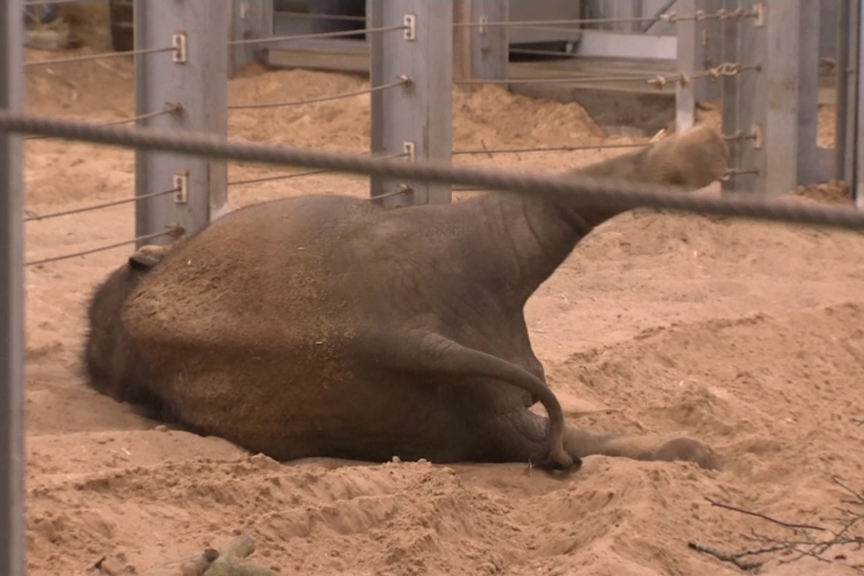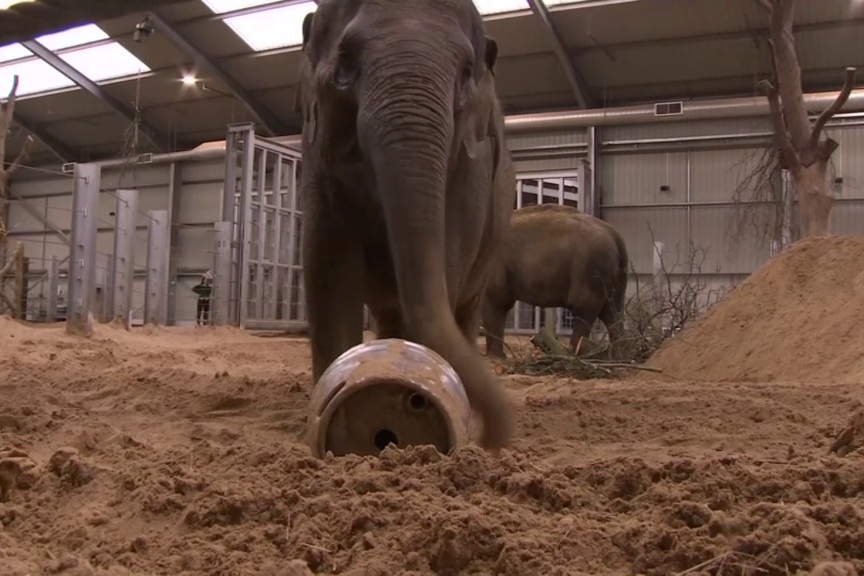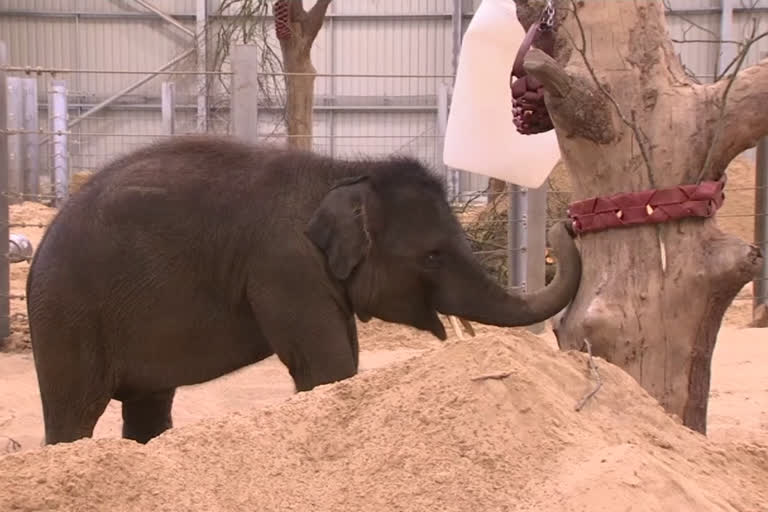Bedfordshire (UK): In the wild an elephant will spend hour upon hour foraging for food.
Here at Whipsnade Zoo keepers and scientists are coming up with all sorts of cunning plans to ensure their elephants use their brains and skills to get to food.
This young bull Sam is five years old and he's worked out that with his nimble trunk he can dislodge pieces of fruit hidden inside this contraption.
In an adjoining area the females are doing much the same, except for Elizabeth who is two years old and is still interested in playing with her exercise ball.
Another older female is knocking about a barrel, seemingly without purpose, but she knows that if she knocks the barrel in a particular way she can dislodge biscuits inside.

The biscuits are prepared using a specific recipe devised by the keepers, they're low on sugar and fat and have concentrated fibre.
By the number of barrels being knocked about you can see they're popular with the elephants.
This zoo was one of five in the UK that took part in a University of Nottingham study which looked at how elephant behaviour can be used to create an indicator of their wellbeing.
The study by the Elephant Welfare Group was led by Dr. Lisa Yon, a specialist in zoo and wildlife medicine at the university's vet school.
The group was initiated by a UK government report in 2008. According to the Department of Environment, Food and Rural Affairs it was a response to research which found that many elephants had foot health and gait problems. The majority were overweight, and around half demonstrated stereotypical behaviours.

Yon says: "The UK government has asked for all the UK zoos to show that they're assessing, monitoring and improving their welfare and the problem we have is there were no existing validated tools for keepers to use to do that and so as we started developing the activities of the elephant welfare group we realised that it was going to be essential early on to develop and validate a tool, something that could be used by keepers, consistent so they'd be used across all the different zoos, something they could use to monitor the wellbeing of their elephants over time so that as they continued to make changes and zoos are constantly making changes to try and improve the facilities and the way they're managing their elephants, that we would have a tool that would capture the benefits that had to their behavioural welfare."
The scientists and keepers have compiled masses of detailed information over five years.
That data bank has enabled them to create a simple questionnaire which helps keepers to quickly take down relevant information which contributes to the existing information.
Whipsnade Zoo is part of the Zoological Society of London which carries out research on animal welfare.
Mark Howes, the deputy leader team leader for the elephants, believes the research has already contributed to improvements.
"So what we're doing is we're trying to analyse the behaviour of the elephants. What we're trying to achieve is so a lot of really natural behaviour. So by using the tool that's been provided to us by Lisa we're kind of monitoring their behaviour throughout different seasons of the year and over a period of time by building this kind of data up we can see that we'll make hopefully positive changes in their care and their welfare over many years."
According to Yon, by involving the keepers, the study has tapped into the sort of detailed information not available to researchers.
"So we've got three different main sections so one of them asks the keepers at set periods of time throughout the day to look at their elephants to watch them for a couple of minutes and then to rate their demeanour, different adjectives that look at they calm are they relaxed, or are they frustrated, or are they anxious? You know looking at all these different aspects of their demeanour. And this is something that in particular enables us to make use of the expertise that our elephant keepers have because many of these people have been working with elephants for many many years."
Here at Whipsnade the elephants come into the enclosure for the evening and their activity is recorded by CCTV overnight and reviewed by the keepers the following day.
Yon says the questionnaire, or tool as they describe it, is now being used at UK zoos nationwide. She says she's also been contacted by zoos in Europe and north America.
The scientists say they are still at the early stages of crunching the data they have, but some improvements have been obvious, for example creating sand surfaces instead of concrete and creating interesting ways for the elephants to forage.
"They really like to lie down next to each other and even touching each other. And so that's a really important behaviour to see if we can encourage that kind of behaviour that rest behaviour. It's a really important part of health and well-being in any animal including elephants and foraging behaviour is really important. So in the wild elephants will forage for 16 to 18 hours a day. And so we want to see that we're encouraging that same kind of foraging behaviour over a big part of the elephant's day," says Yon.
Howse has been at Whipsnade for twelve years and eight of those have been spent with elephants.
He says understanding their behaviour has also helped train the animals to allow them to carry out medical checks.
"So we want to do is we just want to be able to kind of keep an eye on their general health so that'll be everything from checking inside their mouth, to checking their feet, checking all over their body just to make sure they're in good condition. So it's about them presenting different parts of their body so we can just make sure they are okay. And this kind of a training process takes a long time, they've got to learn to trust us and we've got to learn to work with them and hopefully over time you can achieve that."
The research which has been published in the scientific journal PLOS ONE will be part of a ten year report presented to the UK government in 2021.
Also read- Emergency exit door of one of the Christchurch mosques faulty: Survivors



